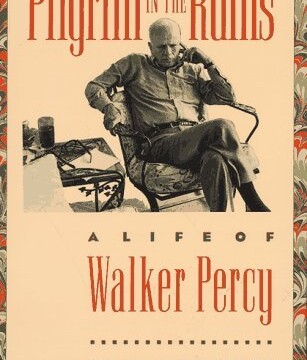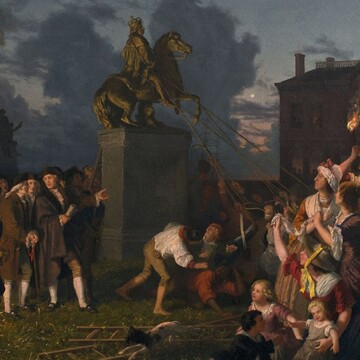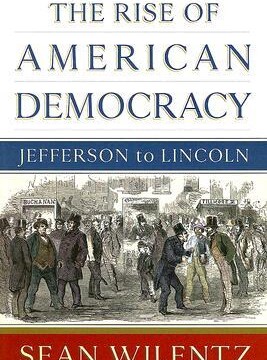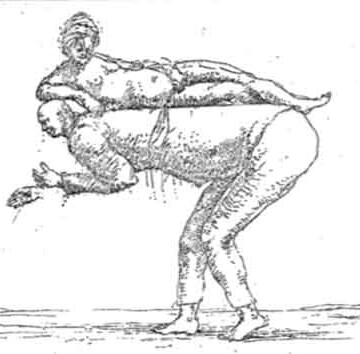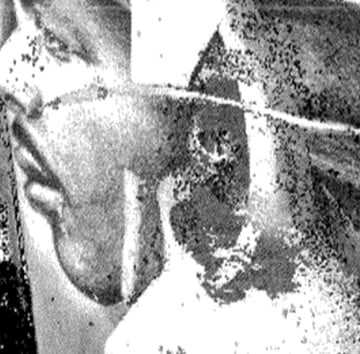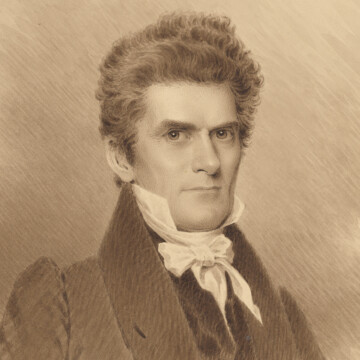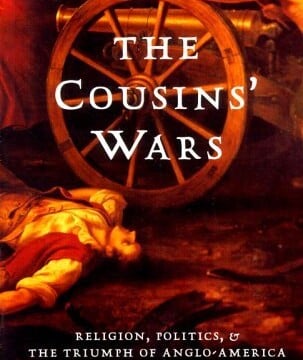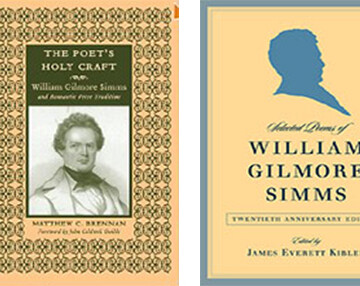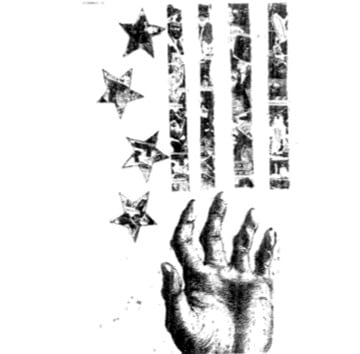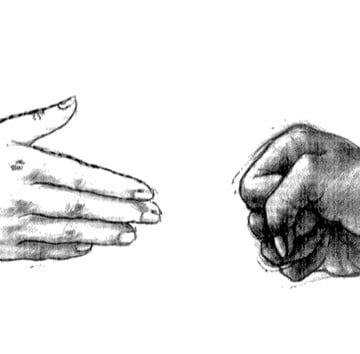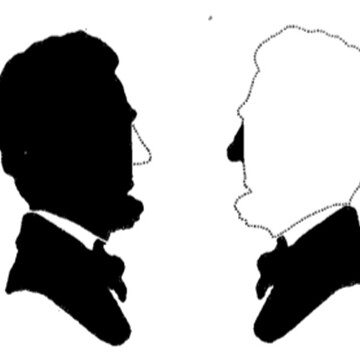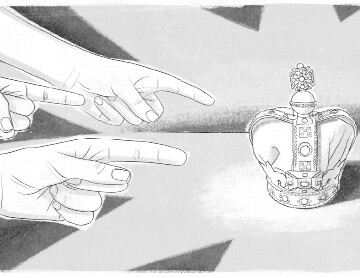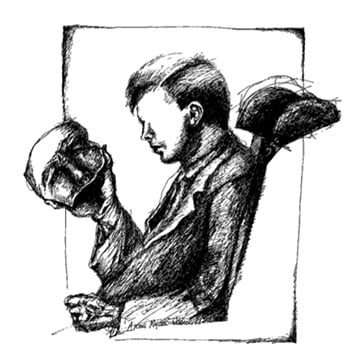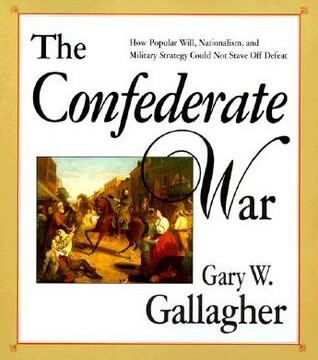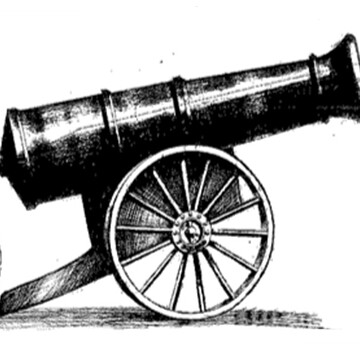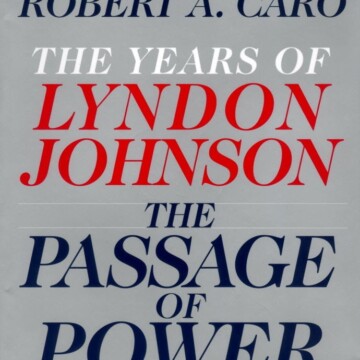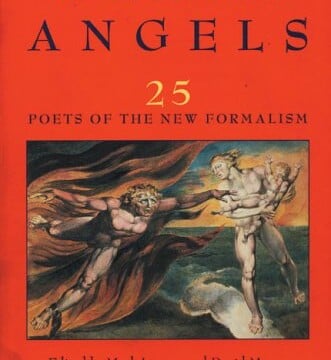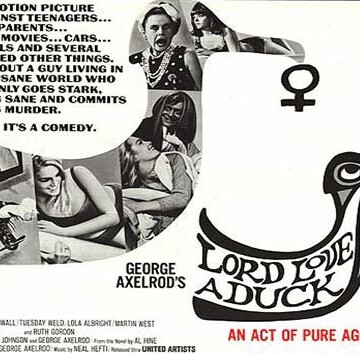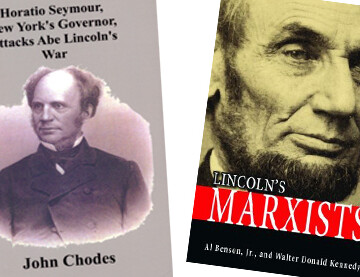Sling Blade, the recent hit film that rightly won Billy Bob Thornton an Academy Award, is now out on video. As viewers of the film know, it is a marvelous tragedy of classical simplicity. But what has not been mentioned is that it is also a tale told in the tradition of Southern literature. As...
2674 search results for: Southern%252525252BHeritage
Allons, Enfants de la Patrie
It was years ago that I first read the collection of Donald Davidson’s essays called Still Rebels, Still Yankees. In one of them, “Some Day, in Old Charleston,” the doughty Last Agrarian addressed one of his perennial themes, the trashiness of modern civilization and the superiority of the Old Southern regime, by describing Charleston’s Army...
Raising a Flag for Mr. Davidson
“An outlaw fumbling for the latch, a voice Commanding in a dream where no flag flies.” —Donald Davidson, “Lee in the Mountains” The University of Missouri’s publication of Where No Flag Flies: Donald Davidson and the Southern Resistance does much to redress a literary grievance. Donald Davidson, the late poet and professor of English at...
L’Etranger Chez Lui
I suppose that after William Faulkner and Eudora Welty and Flannery O’Connor, Walker Percy (1916-1990) has been for the last three decades the most widely read of Southern writers. He has been known as a social observer as well as a novelist, and as a philosopher as well as a Roman Catholic. And he has...
The Last Round-up
Chronicles has a leisurely—almost Southern—production schedule, which means that you should be reading this just about the time the dogwoods blossom. I’m writing it, though, as 1989 draws to a close, ending a decade that, all things considered, could have been worse. But lest we wax too smug about the success of voodoo economics and...
The Origins of the Jerk
(Inspired by Clyde Wilson) Every human society has had its share of offensive or annoying people: busybodies and bores, poseurs and bullies, cheapskates and check-grabbers, hypocrites and egomaniacs. You might even be able to define some societies by the offensive characters they tend to produce or by the qualities they find most offensive. Southerners used to regard...
Will Joe Repudiate His Segregationist Friends?
“Apologize for what? Cory should apologize. He knows better. There’s not a racist bone in my body.” Thus did a stung Joe Biden answer rival Cory Booker’s demand he apologize for telling contributors, in a southern drawl, “I was in a caucus with James O. Eastland, He never called me ‘boy.’ He always called me...
Shall We Gather by the River?
When I was invited last spring to be a judge at the Memphis in May World Championship Barbecue Cooking Contest some envious backbiters put it about that it wasn’t because I’m well known as a discriminating ami de swine, but because my sister knows the woman who picks the judges. I have just one thing...
The American Revolution Was a Culture War
Two hundred and forty-seven years ago this month, a group of American opponents of the Crown’s tax policy donned disguises and set about methodically destroying a shipment of tea imported into Boston by the East India Company. The vandals trespassed on privately owned ships in Boston Harbor and threw the tea into the ocean. These...
A Government We Deserve
“A democracy, when put to the strain, grows weak and is supplanted by oligarchy.” —Aristotle The Rise of American Democracy: Jefferson to Lincoln by Sean Wilentz New York: W.W. Norton; 1,004 pp., $35.00 To write a book about democracy, a word that functions today as little more than an advertising slogan, an author should first...
Witchfinder: The Strange Career of Morris Dees
The trial, conviction, and death sentence of Timothy McVeigh for the Oklahoma City bombing of April 19, 1995, passed quietly this year, far more quietly than most reporters and some political leaders wanted. The main reason for the calmness of the McVeigh proceedings was probably the utterly uninteresting mind, character, and personality of the defendant....
White Sprinters
For several years now, professional baseball has been pouring millions of dollars into developing black players. Evidently, the number of black players, at least American blacks, has been in decline. NASCAR is funding programs to develop black drivers after fielding complaints that the sport is too white. Similarly, the NHL now has a “Diversity Program”...
Attack of the Jacobins
Trent Lott—to the guillotine! The cry has gone up, the mob is implacable, and the once-powerful and seemingly unassailable Senate majority leader has gotten the message loud and clear: Confess your sins, bare your neck, and prepare to lose your head! And for what? What sin did this former muckamuck of the GOP commit that...
The Court Historians
One sometimes feels obliged to contextualize a disagreement, because the point in dispute has still not been clearly stated. I have written critically more than once about the works of C. Bradley Thompson, first about his study of neoconservatism, Neoconservatism: An Obituary for an Idea (2010), and more recently, about a book he completed on America’s Founders, America’s Revolutionary...
In Praise of Sex and Violence
All the best authorities agree: there is too much sex and violence in America. Social critics say that pop culture is reinforcing a cult of violence, which they trace back to the savage days of the American frontier; preachers launch jeremiads at the explicit eroticism of MTV, and Planned Parenthood pretends to have the jumps...
Martin Luther King, Jr., as Conservative Hero
In Campus, a newsletter of the conservative Intercollegiate Studies Institute, a letter last spring from a student subscriber questioned comments about Martin Luther King found in the preceding issue’s feature essay, “A Rage for Merit.” This article portrayed King as a passionate critic of affirmative action, and this, according to the student, does not square...
Remembering John C. Calhoun
Though John C. Calhoun was a distinguished American statesman and thinker, he is little appreciated in his own country. Calhoun rose to prominence on the eve of the War of 1812 as a “war hawk” in the House of Representatives and was the Hercules who labored untiringly in the war effort. While still a congressman,...
Polonophobia, Cont.
“Polonophobia,” my essay in the January issue of Chronicles, engendered moving and informed responses for which I am most grateful. Professors Ewa Thompson and Alex Kurczaba and Dr. Wojciech Wierzewski have all praised me generously in letters to the editor [Eds. note: See the Polemics and Exchanges section of the April issue], but, according to...
Our Inner Mason-Dixon
About a hundred years before the Civil War, two British surveyors, Jeremiah Mason and Charles Dixon, with a crew of ax-men, marked out 270 miles of wilderness. They set a stone at every mile, and another grander one embossed with the arms of the Penn and Calvert clans every five miles. The resulting map pacified...
That Royal Wedding, Reverend Michael Curry, and the End of England
Like many Southern boys growing up in the 1950s, I recall fondly my father reading stories to me of “Stonewall” Jackson in the Shenandoah Valley, of the “Gray Ghost,” Colonel John Mosby, and of Marse Robert Lee who led Confederate armies during the War for Southern Independence. But I also reveled in the exploits of...
The Vanishing Anglo-Saxon Minority
“The Anglo-Saxon carries self-government and self-development with him wherever he goes.” —Henry Ward Beecher For almost exactly 30 years, Kevin P. Phillips has been cranking out some of the most interesting and provocative works of political analysis written since World War II. In 1969, The Emerging Republican Majority argued that American politics runs through periodic...
Cancel the White Men – And What’s left?
“Can we all just get along?” That was the plea of Rodney King after a Simi Valley jury failed to convict any of the four cops who beat him into submission after a 100-mile-an-hour chase on an LA freeway. King’s plea came after the 1992 LA riots, the worst since the New York City draft...
A Holy Craft
The opportunity for a reconsideration, indeed a reconstruction, of literary history is, in the case of William Gilmore Simms’ poetry, both enticing and rewarding. In Matthew Brennan’s analytical volume, we find the basis, fully elaborated, for reengaging with a body of work, the worth of which has only recently been reevaluated. William Gilmore Simms (1806-70)...
Billy, The Fabulous Moolah, and Me
When I first heard that V.S. Naipaul was writing a book about the South, it made me nervous. What would the author of Among the Believers make of Jim and Tammy? Could we look for Louisiana: A Wounded Civilization? Well, I’ve been reading A Turn in the South, just out last winter from Knopf. I’m...
Mississippi Musing
Back in February, a USA Today story on black historical sites mentioned a “Black Confederate Memorial” in Canton, Mississippi, a “20-foot obelisk . . . built in 1894 to honor Harvey’s Scouts, one of the black units that operated behind Union lines to harass supply shipments.” As it happened, I read that story while spending...
Come Home, America
Unanesthetized amputation cannot be more painful than enduring—no, “endurin'”—a Bruce Springsteen monologue about “growin’ up.” Stopping a concert dead in its tracks, he’ll mumble and stammer and “uh, like” his way through a tortured and tortuous tale peopled with Wild Billy and Sloppy Sue and, best of all, “there was this guy.” He shoots for...
Caliban in the Classroom
What do black Americans think of whites? What do they want from them? The questions are almost as baffling as “What do women want?”—the question we raised a few months ago. After years of living with the men and women we used to call colored people, working with them and calling some of them friends,...
A Clever Diversion
Amistad Produced by Steven Spielberg, Debbie Allen, and Colin Wilson Directed by Steven Spielberg Screenplay by David Franzoni Released by Dreamworks If Amistad is not yet a household word like E.T. or Jurassic Park, it may soon be with the power of Steven Spielberg behind it. Amistad is really two movies. One, about the 19th-century...
Equality, Left and Right
Among the significant changes on the American intellectual right in the last 50 years is the growing emphasis on equality. From the speeches of Jack Kemp and the collected works of Professor Harry V. Jaffa to the arguments advanced for Proposition 209 in California, it seems that equality is not only a principle worthy of...
The Illinois Negro Code
Most people believe the history of race relations in the United States is neatly divided by geography. Those states north of the Mason-Dixon Line were paragons of equality and liberty, where race was not an issue and diversity flourished in all its glory. ...
Answering Islam
Americans find it difficult to understand the Islamic threat. It is not just that they have made the mistake of listening to presidential speeches on the “religion of peace” or dulled their wits reading the New York Times and the Wall Street Journal. The fault does not lie exclusively or even primarily with American schools,...
A Little Rebellion
Scandalously, Thomas Jefferson once wrote to James Madison, “I hold it that a little rebellion now and then is a good thing, and is as necessary in the political world as storms in the physical.” In the same year, 1787, in regard to what is known as Shays’ Rebellion, he wrote ...
A Little Rebellion
Scandalously, Thomas Jefferson once wrote to James Madison, “I hold it that a little rebellion now and then is a good thing, and is as necessary in the political world as storms in the physical.” In the same year, 1787, in regard to what is known as Shays’ Rebellion, he wrote another friend, “God forbid...
Getting Nixon Right
In November 1972 I voted for the re-election of President Nixon. Granted, it was only an elementary-school straw poll, but I was still thrilled when he carried the student body by a three-to-one margin. On election night, the electoral map was covered in a sea of blue (in those days each party retained its appropriate...
Decency Through Strength
“Ideas rule the world and its events. A revolution is a passage of an idea from theory to practice. Whatever men say, material interests never have caused and never will cause a revolution.” —Mazzini My grandmother, the daughter of a Confederate “high private,” always said that if someone had done something particularly good, you could...
An Honorable Defeat
Imagine America invaded by a foreign power, one that has quadruple the population and industrial base. Imagine that this enemy has free access to the world’s goods as well as an inexhaustible supply of cannon fodder from the proletariat of other countries, while America itself is tightly blockaded from the outside world. New York and...
The Suicide of the West
The issue of Kosovo, which has been simmering since the United States waged a war of unprovoked and unjustifiable aggression against the former Yugoslavia, is boiling over. While Serbian “public opinion” is said to be more interested in economic questions, the resentment against the international community is real. As one senior advisor to Prime Minister...
Antiquities of the Republic
“The United States shall guarantee to every state in this Union a republican form of government.” —Constitution of the United States, Article IV Until the triumph of the civil-rights movement at the end of the 1960’s, probably the most disruptive and recurrent conflict in American politics came from the struggle between...
Uncle Sam and the Third Balkan War
Whenever you hear the New World Order crowd whining about the obligation of the “international community” to come to the rescue of a “multiethnic democracy” threatened by “nationalism,” get ready for Uncle Sam to be dragged off on a fool’s errand. This term, “multiethnic democracy,” the prime exemplar of which is supposedly the United States,...
Three Voices From the South
Nearly sixty years ago John Peale Bishop published a remarkable essay in the Virginia Quarterly Review entitled “The South and Tradition.” In it he ruminated on the Old South—its glories and failings—and said that the South had a civilization because like civilizations elsewhere (in Rome, France, England) there was “a continuous succession of manners, which...
‘Open Borders’ Biden Is Remaking America
“The United States shall guarantee to every State in this Union a Republican Form of Government, and shall protect each of them against Invasion.” So reads Article IV, Section 4 of the Constitution. Historically, that constitutional duty—to protect America’s states against invasion—has been the province of the president of the United States, the chief executive,...
Institutionalizing Compassion
Writing in the mid-1980’s, Forrest McDonald observed that America’s founders would have recognized their handiwork as late as the early 1960’s, but not after. Despite technological changes, the Civil War, the Progressive Era, the New Deal, and two world wars, the governments most Americans dealt with were state and local. Except for the draft board...
On Sling Blade
Since I had emerged from the theater in Foley, Alabama, somewhat sickened after watching Sling Blade, imagine my surprise when I found Clyde Wilson endorsing the film in Chronicles (Cultural Revolutions, November 1997). Because I’ve met Dr. Wilson and respect him greatly, I figured I must have been a shallow rube the first time I...
A Humane Historian
In this book Harriet Owsley remembers the life, friendships, and scholarly career she shared with her husband, Frank Lawrence Owsley. The subtitle of her memoir calls attention to her husband’s field of study as teacher and scholar. His three books on the Old South are definitive, and they are still in print: State Rights in...
Pro Patria
The recent passing of Mel Bradford has cast a chastening light upon this latest of his collections. Who had wished to be reminded of the author’s indispensability in this or indeed any other way? Yet reminded we are and must be. This book means much in itself as it stands, and means more as the...
A Picturesque, Unprofitable Craft
“Poetry is the Devil’s wine.” —St. Augustine In his prophetic poem “The Silence of the Poets,” Dana Gioia imagines a time in the not too distant future when poetry will be a completely lost art. “A few observers voiced their mild regret / about another picturesque, unprofitable craft / that progress...
Suicide State
“We don’t divorce our men; we bury them,” instructs Stella Bernard, played by a loony Ruth Gordon, in Lord Love a Duck (1966). That’s certainly better social policy than America has pursued since 1970, with no-fault divorce shattering families. No custody battles. No brawls over alimony and child support. No kids shuttled back and forth...
Sesquicentennial Sidelights
Despite all that has passed since, the war of 1861-65 arguably remains the central event of American history. In proportion to population no other event equals it in mobilization, death, destruction, and revolutionary change. We are into the Sesquicentennial, and one would like to think that Americans will take the opportunity to contemplate where we...
A Wide World of Winless War
The tabs on their shoulders read “Special Forces,” “Ranger,” “Airborne.” And soon their guidon—the “colors” of Company B, 3rd Battalion of the U.S. Army’s 7th Special Forces Group—would be adorned with the “Bandera de Guerra,” a Colombian combat decoration. “Today we commemorate sixteen years of a permanent fight against drugs in a ceremony where all...
Fighting Among the Hedgerows
As a young college student, I accepted implicitly all the goals of the Civil Rights revolution. I believed firmly that schools should be integrated, even though the nearest thing to integration I had ever experienced was going to school with a part-Ojibwe in Superior, Wisconsin, a lily-white town in which black people were not allowed...

